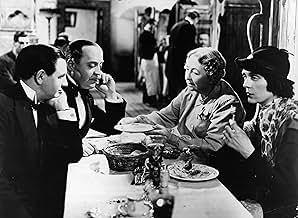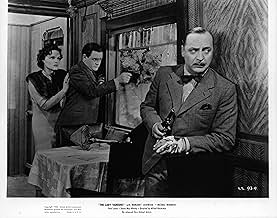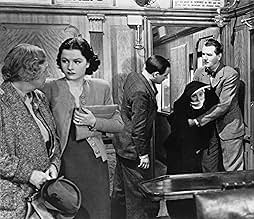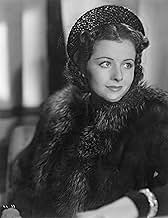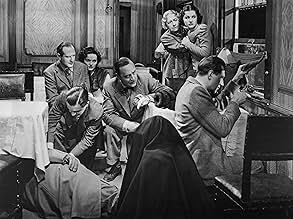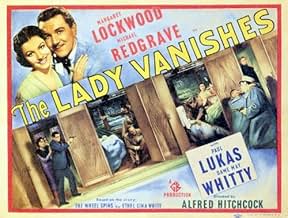IMDb-BEWERTUNG
7,7/10
59.730
IHRE BEWERTUNG
Während einer Reise durch Kontinentaleuropa stellt ein reiches junges Playgirl fest, dass eine ältere Dame aus dem Zug verschwunden zu sein scheint.Während einer Reise durch Kontinentaleuropa stellt ein reiches junges Playgirl fest, dass eine ältere Dame aus dem Zug verschwunden zu sein scheint.Während einer Reise durch Kontinentaleuropa stellt ein reiches junges Playgirl fest, dass eine ältere Dame aus dem Zug verschwunden zu sein scheint.
- Regie
- Drehbuch
- Hauptbesetzung
- Auszeichnungen
- 1 Gewinn & 1 Nominierung insgesamt
May Whitty
- Miss Froy
- (as Dame May Whitty)
Selma Vaz Dias
- Signora Doppo
- (as Zelma Vas Dias)
Catherine Lacey
- The Nun
- (as Catherine Lacy)
Empfohlene Bewertungen
From 1938, The Lady Vanishes is clearly where Hitch was getting comfortable in his trade. Starting slowly, it soon revs up with mystery and intrigue. But I think that was the whole point. A seemingly innocuous day can lead itself into adventure.
Starting in some remote European village, a woman meets a little old lady. Getting on the train the next day, the old lady vanishes without a trace while she is asleep. When she asks about the lady, people say that there was no old lady. The mystery then ensues as our leading lady tries to uncover the plot behind a woman she knows was there.
The main aspect of this movie is the everyday humor that is applied. The two English fellows who are only looking for the latest cricket scores, score themselves some remarkable laughs. Our hero that comes to the leading woman's assistance is funny and charming himself. The time spent at the beginning in the hotel may seem to be off topic, making a viewer wonder where the mystery is, but the point is that the viewer becomes acquainted with the characters and are much more believable to the viewer. Again, I think Hitch was showing us our next door neighbors and how they can rise up against unusually dangerous circumstances. I think my analysis of Hitch would be his championing the moral fiber of everyman. I think that is why Hitchcock films still stand today as some of the best ever made.
This movie receives my major recommendation. Not done yet. I got more to view and review. What fun!
Starting in some remote European village, a woman meets a little old lady. Getting on the train the next day, the old lady vanishes without a trace while she is asleep. When she asks about the lady, people say that there was no old lady. The mystery then ensues as our leading lady tries to uncover the plot behind a woman she knows was there.
The main aspect of this movie is the everyday humor that is applied. The two English fellows who are only looking for the latest cricket scores, score themselves some remarkable laughs. Our hero that comes to the leading woman's assistance is funny and charming himself. The time spent at the beginning in the hotel may seem to be off topic, making a viewer wonder where the mystery is, but the point is that the viewer becomes acquainted with the characters and are much more believable to the viewer. Again, I think Hitch was showing us our next door neighbors and how they can rise up against unusually dangerous circumstances. I think my analysis of Hitch would be his championing the moral fiber of everyman. I think that is why Hitchcock films still stand today as some of the best ever made.
This movie receives my major recommendation. Not done yet. I got more to view and review. What fun!
Dame Mae Witty gives a memorable performance as the old woman who goes missing. The rest of the cast is great with Margaret Lockwood as the woman she befriends on the train. Sir Michael Redgrave also is wonderful as the obvious love interest of Lockwood. The film is truly filled with Hitchcock's stamp all over it. He takes a simple story and makes us not only intriguing but entertaining as well. They remade the film again in 1978 more than 40 years after this film debuted in British cinema. This classic film should not be mixed up with that one. I enjoyed this film. It had its humorous moments. I think this film is really wonderful to watch without being too much. Nowadays filmmakers can take note by Hitchcock's genius and talent. You do not need grand special effects today to create a memorable film but great actors and decent writing. This film is a great film about a good old fashioned mystery without deterring the audience. This film is good old fashioned movie making at its best.
The Lady Vanishes is a wonderful piece of fluff, the culmination of Hitchcock's British period, after which he started to explore more serious themes in his American films. Of course the basic plot is absurd, centering around the most ridiculous way to get a secret message through one can think of, and why did.....o well, never mind, it's the handling that matters, and Hitchcock achieves a near perfect balance here of humour and suspense that he only really matched on one other film, North By Northwest.
The film spends 20 or so minutes just introducing it's characters, but they are all so great, especially the two men so obsessed with returning to a cricket match that a case of disappearance and possibly murder is relatively unimportant, that it hardly matters, while Michael Redgrave and Margaret Lockwood simply sparkle as the main couple who of course initially can't stand each other. Once on the train, the ensuring mystery and sleuthing are riveting,and full of fantastic little details- the name on the window, the nun with high heeled shoes, the fight amidst a magician's paraphenalia The final shootout is excellently staged and still quite exciting. The laughs are constant, with some helarious lines, but they never detract from the suspense. Of course there's those shoddy model shots, but hell, this is a film from 1939!
Hitchcock had countless classics to come, including such complex masterpieces as Vertigo and Rear Window, but the delightful, hugely enjoyable The Lady Vanishes is a little masterpiece of it's own.
The film spends 20 or so minutes just introducing it's characters, but they are all so great, especially the two men so obsessed with returning to a cricket match that a case of disappearance and possibly murder is relatively unimportant, that it hardly matters, while Michael Redgrave and Margaret Lockwood simply sparkle as the main couple who of course initially can't stand each other. Once on the train, the ensuring mystery and sleuthing are riveting,and full of fantastic little details- the name on the window, the nun with high heeled shoes, the fight amidst a magician's paraphenalia The final shootout is excellently staged and still quite exciting. The laughs are constant, with some helarious lines, but they never detract from the suspense. Of course there's those shoddy model shots, but hell, this is a film from 1939!
Hitchcock had countless classics to come, including such complex masterpieces as Vertigo and Rear Window, but the delightful, hugely enjoyable The Lady Vanishes is a little masterpiece of it's own.
The Lady Vanishes (1938)
A Hitchcock movie filled with mystery but lacking suspense. Which is quite fine, turning "The Lady Vanishes" into a fun movie with lots of wry jokes and clever twists. You can't take it any more seriously than Hitchcock did, and he famously had fun with his ideas. That's one reason why they are recognizably Hitch.
This is a transitional movie for the director in many ways. For one thing it was hugely successful in Britain, and then later in the U.S., and Hitchcock soon moved to Hollywood where his stellar string of successes for over 20 years began. But that said, this is a film filled with provincial humor (that was a joke, in case you are British)--that is, you need to have a feel for British humor, and for the style of joking and making witty remarks (constantly) of the time. It's a hilarious movie. When you aren't laughing you're still tickled.
Which is what disappoints some viewers expecting "Psycho" or something. Nope. But you'll recognize the director's hand here, mixing regular people who are misunderstood (if not quite accused of something they didn't do) and who end up having to solve the problem themselves. And so it goes, and they do rather well for a couple of ordinary folk.
When I say there is no suspense I mean it, even when there is uncertainty. The biggest twist of the whole plot (not to be mentioned here!) is only kept from the viewer for a short while. Then the actors tell you! Yes, you are let in on the secret, and yet the movie goes on from there. That is--it's not about worrying and trying to figure it out. It's about watching the main characters work together and piece together their way out of a sticky situation. And of course eventually fall in love.
You forget sometimes that the key element in nearly every Hitchcock movie is a love story. After all, that's what matters to most of us (or all of us?) day after day, so he zeroes in on that even as the world is threatened by uranium 235 ("Notorious"), a murderer in the apartment complex ("Rear Window"), the ghost of a previous wife ("Rebecca") and so on. (Of these, "Psycho" is an interesting exception.) So watch what is actually a romantic comedy with a dash of international intrigue in the ominous year leading up to WWII, which hasn't happened at the time of filming. Great stuff.
A Hitchcock movie filled with mystery but lacking suspense. Which is quite fine, turning "The Lady Vanishes" into a fun movie with lots of wry jokes and clever twists. You can't take it any more seriously than Hitchcock did, and he famously had fun with his ideas. That's one reason why they are recognizably Hitch.
This is a transitional movie for the director in many ways. For one thing it was hugely successful in Britain, and then later in the U.S., and Hitchcock soon moved to Hollywood where his stellar string of successes for over 20 years began. But that said, this is a film filled with provincial humor (that was a joke, in case you are British)--that is, you need to have a feel for British humor, and for the style of joking and making witty remarks (constantly) of the time. It's a hilarious movie. When you aren't laughing you're still tickled.
Which is what disappoints some viewers expecting "Psycho" or something. Nope. But you'll recognize the director's hand here, mixing regular people who are misunderstood (if not quite accused of something they didn't do) and who end up having to solve the problem themselves. And so it goes, and they do rather well for a couple of ordinary folk.
When I say there is no suspense I mean it, even when there is uncertainty. The biggest twist of the whole plot (not to be mentioned here!) is only kept from the viewer for a short while. Then the actors tell you! Yes, you are let in on the secret, and yet the movie goes on from there. That is--it's not about worrying and trying to figure it out. It's about watching the main characters work together and piece together their way out of a sticky situation. And of course eventually fall in love.
You forget sometimes that the key element in nearly every Hitchcock movie is a love story. After all, that's what matters to most of us (or all of us?) day after day, so he zeroes in on that even as the world is threatened by uranium 235 ("Notorious"), a murderer in the apartment complex ("Rear Window"), the ghost of a previous wife ("Rebecca") and so on. (Of these, "Psycho" is an interesting exception.) So watch what is actually a romantic comedy with a dash of international intrigue in the ominous year leading up to WWII, which hasn't happened at the time of filming. Great stuff.
Alfred Hitchcock was noted for his light comic touch, but history records only one attempt at a full-out comedy, 1955's "The Trouble With Harry." The real trouble with "Harry" is it's not funny, but fortunately Hitchcock did leave us with a much surer and defter comedy in the guise of a thriller. Enter "The Lady Vanishes."
The opening scene gets a lot of hackles from people, as we find ourselves in a mountain valley where, after the credits roll, the camera glides over what is obviously a miniature train set. We even see a toy roadster glide by as the camera closes on the exterior of a model house.
Why, it's so primitive and fake! exclaim viewers accustomed to "Matrix"-style FX.
But they miss the point, and not just because they fail to take account of the time when the film was made. Here's what I think: Hitchcock shot the scene with a deliberate nod at the hokeyness of it, reminding his audience from the start that this is not the real thing but play-acting, to be taken as such. He knows it looks a bit phony (though the arresting pan-and-zoom would be the sort of opening other directors would imitate as soon as the technology let them). The focus of "The Lady Vanishes" is not politics, or even mystery. It is fun, in the same non-critical way as a child's entertainment. In this, Hitchcock succeeds, and creates no mere time capsule but a vessel of entertainment that has withstood decades of changing fashion, because it is first, last, and always fun.
"The Lady Vanishes" is the sort of film that works on pace, craft, and charm. The plot is well thought-out, provided you yourself try not to think about it much. There's really no reason for the story to go down the way it does, and once the movie is over, you begin to see the holes. Why is it necessary for British intelligence to go through so much trouble for info that could be just as easily delivered by telegram, or diplomatic pouch? Why, if you cold-bloodedly swipe a woman from a train, do you leave a witness behind to blurt out that there's been a disappearance? How come a name written on the inside of a train compartment window is erased by a blast of locomotive smoke across the outside of the window? But the engaging plot does what it is supposed to, keeping you interested and wondering what will happen next, rather than why it is happening the way it is.
The storyline of "The Lady Vanishes" is unlike any Hitchcock film. It's so light and airy that it reminds me more of a Tintin comic book, with the mythical Slavic nation of Vandreka the sort of simultaneously quaint and suspicious setting Herge would stick Captain Haddock and the Thompson Twins. Leave aside your sophisticated Dashiell Hammett-fed expectations for a moment. If you let yourself go, you will be transported, and quite entertained. Hitchcock never meshed comedy so thoroughly in the body of a story as he does here. Even "North By Northwest" has its serious spots, but "The Lady Vanishes" features a tense fight in a baggage car that's right out of Abbott & Costello and a climactic shootout that pauses for jokes between Caldicott and Charters, the cricket-mad pair who are a non-stop font of humor.
Margaret Lockwood is an effective plot vehicle as doughty Iris, who refuses to believe a knock on the head made her imagine the presence of the title character, Miss Froy. Michael Redgrave (Vanessa's pop) is a revelation as Gilbert, the folk-music scholar who half-humors, half-believes her strange tale until a stray scrap of trash converts him to her cause. He has a wonderful Errol Flynn-like quality, with his toothbrush mustache and his way with a quip.
Speaking of quips, the dialogue in this movie sparkles throughout, as when the barrister tells his mistress "The law, like Caesar's wife, must be above reproach," and she replies "Even when the law just spent six weeks with Caesar's wife?" Or when Iris asks how she was supposed to have replaced Miss Froy's face with that of the sinister Madame Kummer, and Gilbert replies: "Any change would be an improvement."
Interesting also for the opening, which ambles on for about 20 minutes before it starts to go anywhere, establishing the characters and the comic tone without offering a whiff of what the mystery might be. The close, too, with villains who seem oddly detached once the story is resolved ('Jolly good luck to them,' Paul Lukas observes enigmatically.) But that's for film scholars to muse over.
Hitchcock was never as agreeable a companion as he was here. And few films will put the kind of smile on your face like 'The Lady Vanishes,' no matter how long ago it was made.
The opening scene gets a lot of hackles from people, as we find ourselves in a mountain valley where, after the credits roll, the camera glides over what is obviously a miniature train set. We even see a toy roadster glide by as the camera closes on the exterior of a model house.
Why, it's so primitive and fake! exclaim viewers accustomed to "Matrix"-style FX.
But they miss the point, and not just because they fail to take account of the time when the film was made. Here's what I think: Hitchcock shot the scene with a deliberate nod at the hokeyness of it, reminding his audience from the start that this is not the real thing but play-acting, to be taken as such. He knows it looks a bit phony (though the arresting pan-and-zoom would be the sort of opening other directors would imitate as soon as the technology let them). The focus of "The Lady Vanishes" is not politics, or even mystery. It is fun, in the same non-critical way as a child's entertainment. In this, Hitchcock succeeds, and creates no mere time capsule but a vessel of entertainment that has withstood decades of changing fashion, because it is first, last, and always fun.
"The Lady Vanishes" is the sort of film that works on pace, craft, and charm. The plot is well thought-out, provided you yourself try not to think about it much. There's really no reason for the story to go down the way it does, and once the movie is over, you begin to see the holes. Why is it necessary for British intelligence to go through so much trouble for info that could be just as easily delivered by telegram, or diplomatic pouch? Why, if you cold-bloodedly swipe a woman from a train, do you leave a witness behind to blurt out that there's been a disappearance? How come a name written on the inside of a train compartment window is erased by a blast of locomotive smoke across the outside of the window? But the engaging plot does what it is supposed to, keeping you interested and wondering what will happen next, rather than why it is happening the way it is.
The storyline of "The Lady Vanishes" is unlike any Hitchcock film. It's so light and airy that it reminds me more of a Tintin comic book, with the mythical Slavic nation of Vandreka the sort of simultaneously quaint and suspicious setting Herge would stick Captain Haddock and the Thompson Twins. Leave aside your sophisticated Dashiell Hammett-fed expectations for a moment. If you let yourself go, you will be transported, and quite entertained. Hitchcock never meshed comedy so thoroughly in the body of a story as he does here. Even "North By Northwest" has its serious spots, but "The Lady Vanishes" features a tense fight in a baggage car that's right out of Abbott & Costello and a climactic shootout that pauses for jokes between Caldicott and Charters, the cricket-mad pair who are a non-stop font of humor.
Margaret Lockwood is an effective plot vehicle as doughty Iris, who refuses to believe a knock on the head made her imagine the presence of the title character, Miss Froy. Michael Redgrave (Vanessa's pop) is a revelation as Gilbert, the folk-music scholar who half-humors, half-believes her strange tale until a stray scrap of trash converts him to her cause. He has a wonderful Errol Flynn-like quality, with his toothbrush mustache and his way with a quip.
Speaking of quips, the dialogue in this movie sparkles throughout, as when the barrister tells his mistress "The law, like Caesar's wife, must be above reproach," and she replies "Even when the law just spent six weeks with Caesar's wife?" Or when Iris asks how she was supposed to have replaced Miss Froy's face with that of the sinister Madame Kummer, and Gilbert replies: "Any change would be an improvement."
Interesting also for the opening, which ambles on for about 20 minutes before it starts to go anywhere, establishing the characters and the comic tone without offering a whiff of what the mystery might be. The close, too, with villains who seem oddly detached once the story is resolved ('Jolly good luck to them,' Paul Lukas observes enigmatically.) But that's for film scholars to muse over.
Hitchcock was never as agreeable a companion as he was here. And few films will put the kind of smile on your face like 'The Lady Vanishes,' no matter how long ago it was made.
Wusstest du schon
- WissenswertesIn order to get a realistic effect, Sir Alfred Hitchcock insisted that there should be no background music except at the beginning and the end. Between those two points, the only music heard is the music sung by the musician outside the hotel, the music tune of Miss Froy, the "Colonel Bogey March" music hummed by Gilbert (Michael Redgrave), the dance music conducted by Gilbert in his hotel room, and the dance music when Iris (Margaret Lockwood) meets Gilbert in the train.
- PatzerIn the noisy dancing scene above Lockwood's hotel room, the clarinet is shown with the mouthpiece turned with the reed upwards. Normally the mouthpiece is turned so that the reed is downwards, but in some European folk traditions the clarinet was played with the mouthpiece "upside-down".
- Zitate
Gilbert: Can I help?
Iris Henderson: Only by going away.
Gilbert: No, no, no, no. My father always taught me, never desert a lady in trouble. He even carried that as far as marrying Mother.
- Crazy CreditsClosing credits: The Characters in "THE LADY VANISHES" were played by:
- Alternative VersionenA brief segment where a hotel maid bends down to pick up a hat from under a hotel bed is missing from most US releases, including Criterion's first official DVD and all bootlegs. It's intact in all official non-US releases and has been restored for Criterion's 2-disc remastered DVD.
- VerbindungenEdited from Otto, zieh' die Bremse an! (1937)
Top-Auswahl
Melde dich zum Bewerten an und greife auf die Watchlist für personalisierte Empfehlungen zu.
Details
- Erscheinungsdatum
- Herkunftsland
- Offizieller Standort
- Sprachen
- Auch bekannt als
- La dama desaparece
- Drehorte
- Produktionsfirma
- Weitere beteiligte Unternehmen bei IMDbPro anzeigen
Box Office
- Weltweiter Bruttoertrag
- 41.493 $
- Laufzeit1 Stunde 36 Minuten
- Farbe
- Seitenverhältnis
- 1.37 : 1
Zu dieser Seite beitragen
Bearbeitung vorschlagen oder fehlenden Inhalt hinzufügen

Oberste Lücke
By what name was Eine Dame verschwindet (1938) officially released in India in English?
Antwort

